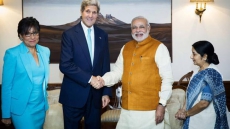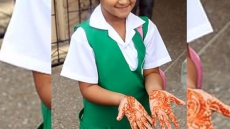WASHINGTON — Malala Yousafzai, a Nobel Prize winner and global icon for girls' education, is spreading her philosophies of human rights and youth empowerment to college and high school classrooms across the world.
George Washington University, The Malala Fund and the publisher of a memoir about the Pakistani teen are launching a free, online resource guide for college and university classrooms to use while teaching her book, "I Am Malala." A high school version of the online guide will be available next year.
The free syllabus will look at her story and reflect on eight themes, including violence against women and girls, education as a human right for girls, cultural politics, religious extremism and global feminism.
Malala's father Ziauddin Yousafzai, an educator who wrote the guide's preface, said the curriculum can help girls and boys, men and women.
"This is also the story of her father, who supports his daughter," he said in an interview with The Associated Press. "This is the story of a father who always says that if you ask me 'what I did for my daughter?' Don't ask me what I did, rather ask me, 'what I didn't do?' I didn't clip her wings. And this is a very powerful message, because, really I didn't do anything special."
"Every parent, every brother, every husband, every father can get this message from this book that we have kept our women suppressed," he said. "So, it tells the world, 'let's stop it.' It is unjust, it is unfair to (hold) back half of the population. "
Yousafzai said the curriculum will help Malala's experience move from a media sensation to a "story for all generations" for years to come.
The school curriculum on the memoir was created last year by George Washington faculty members and first taught during the fall 2014 semester.
In 2012, a Taliban gunman walked up to a bus taking Malala and other children home from school in Pakistan's volatile northern Swat Valley and shot her in the head and neck. Malala, 17, now resides in Britain, where she was flown for medical care after the attack.





